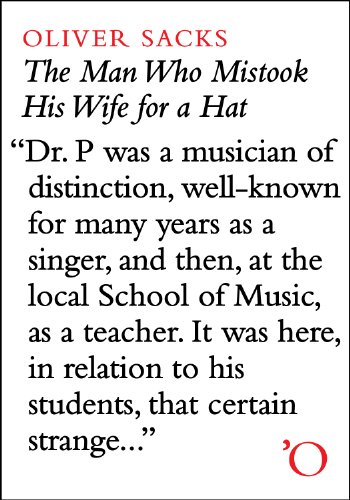Dr. Sacks treats each of his subjectsthe amnesic fifty year old man who believes himself to be a young sailor in the Navy, the disembodied woman whose limbs have become alien to her, and of course the famous man who mistook his wife for a hatwith a deep respect for the unique individual living beneath the disorder.
These tales inspire awe and empathy, allowing the reader to enter the uncanny worlds of those with autism, Alzheimer's, Tourette's syndrome, and other unfathomable neurological conditions.
One of the great clinical writers of theth century The New York Times, Dr, Sacks brings to vivid life some of the most fundamental questions about identity and the human mind, I have been trying to understand why I find this much celebrated book vaguely unsatisfying, In view of its extraordinary subject matter, it should be a riveting read, yet I find it rather dull, Recently, I read Janovs “Why You Get Sick and How You Get Well”, a totally compelling and invigorating read, demanding at times but so lucidly written.
I wonder what group of people, Sacks had in mind as potential readers, It seems to me to rather titivate the lay reader, while blinding him/her with science at the same time, What we have is a seemingly random series of accounts of patients, who had failed with other medical professionals, but who succeeded insofar as it was possible with him.
Beneath the surface there is the irritant of Sacks egocentricity, We are introduced to a wide range of neurological conditions: tilting bodies, aphasia, Parkinsons, Tourettes syndrome, autism and others, Some are really extraordinary, such as the identical twins suffering from autism, who have an astonishing ability to see numbers, often of numerous digits, provided that they are prime numbers.
There seems to be little doubt that Sacks drew out special abilities in many different fields that others had overlooked owing to pigeon holing the subjects, often in the light of their tested IQs.
There is plenty of scientific reference to underpin Sacks conclusions, What we do not have is the broader contexts in which these people lived: their social connections, often whether or not they are permanently in institutions or whether they are able to function to a degree within society at large.
I dont think that I have really answered my own question, but hope that I might have given a few pointers as to why I am unable to enthuse warmly about this book.
Incredible man, incredible book. It was recommended to me to read during my Psychology degree, Did I bother reading it then Nope, But I have finally got around to it, Much of it is already known from my studies but still a very interesting read, A very sad state of affairs for some patients mentioned in the book but very interesting to see just what the brain will put up with, how it translates after a trauma and how people adapt.
Worth a read, each chapter is a short story about a new person, As with some other reviewers, I found this book quite unsatisfying, Oliver Sacks was enormously experienced and widely respected yet this book just didnt hold my attention, I found it somewhat tedious there was just no enthusiasm injected into this interesting subject, Indeed it reads like a list of his consultations, in no particular order or connection, Symptoms and conditions are described but without any real compassion or insight, but almost with a sense of scientific analysis, I was left with a feeling that these poor individuals appeared to paraded as oddities, somewhat of a circus sideshow, Eventually I gave up, and it took me few months to venture into another of Sacks books “Musicophilia” which was extremely compelling, fascinating and highly compassionate.
This is a book I would highly recommend, This is one of the most fascinating books I've ever read, I'm guessing I've brought it up hundreds of

times in conversation, It's written by a neurologist who works with people who have stranger than usual brain issues, And not only are the cases interesting, but the way he writes about the people invovled is really lovely, It's not clinical at all, Not judgemental. It's very loving, I would say, It's interesting to see someone who obviously knows a lot of hard line science write about these cases in terms that seem to me suited to someone who would be a philosopher or a spiritualist.
Amazing book. Can't recommend it highly enough even if you dont like non fiction, I stumbled across this whilst doing my undergraduate psychology degree, bought it, and it sat on my shelf for a while before I eventually got around to reading it.
I found it quite difficult to concentrate on because the pages feel quite full, and Ive been struggling with low mood lately, If youre under the weather, struggling with fatigue etc, you might find it a hard read to get through I found myself frequently putting it down after a few pages due to feeling mentally heavy.
It is an enjoyable read nonetheless,
Oliver Sacks was born inin London and was educated at Queens College, Oxford, He completed his medical training at San Franciscos Mount Zion Hospital and at UCLA before moving to New York, where he soon encountered the patients whom he would write about in his book Awakenings.
Dr Sacks spent almost fifty years working as a neurologist and wrote many books, including The Man Who Mistook His Wife for a Hat, Musicophilia, and Hallucinations, about the strange neurological predicaments and conditions of his patients.
The New York Times referred to him as the poet laureate of medicine, and over the years he received many awards, including honours from the Guggenheim Foundation, the National Science Foundation, the American Academy of Arts and Letters, and the Royal College of Physicians.
In, he was appointed Commander of the British Empire, His memoir, On the Move, was published shortly before his death in August,